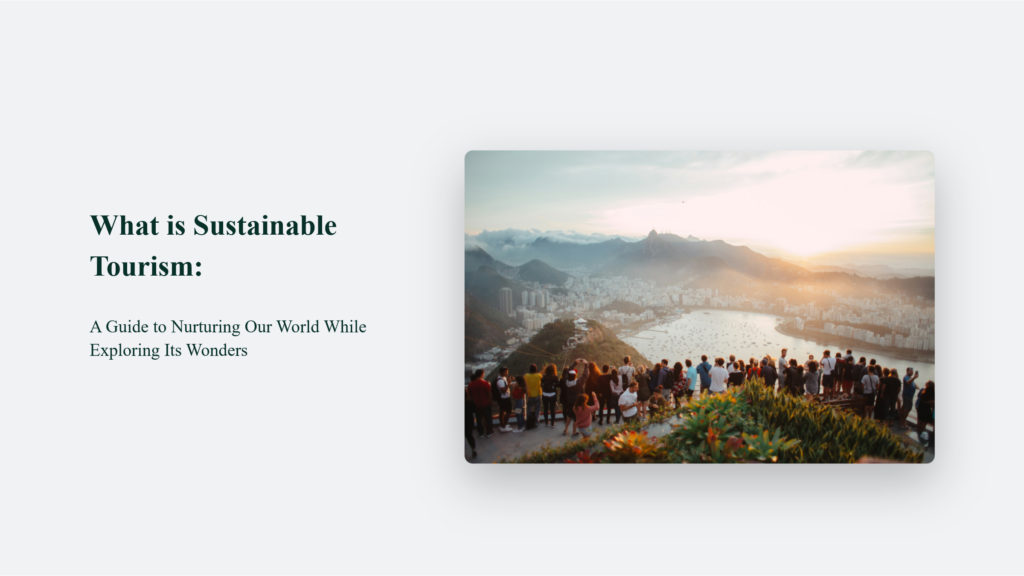In an era where wanderlust meets a growing consciousness about the footprints we leave behind, sustainable tourism emerges as a beacon of hope and action. This approach to travel and exploration is not just a fleeting trend but a profound commitment to nurturing the environment, empowering local communities, and fostering economic growth.
So, what is sustainable tourism? Let’s find out!

What is Sustainable Tourism?
Sustainable tourism transcends the conventional travel experience, encompassing a holistic concern for economic stability, social equity, and environmental preservation. It seeks to enhance the tourist experience while ensuring host communities’ prosperity and well-being. This form of tourism is anchored in the principles of sustainable development, aspiring to be a force for good that mitigates the adverse effects of tourism activities.
A Closer Look at Sustainable Tourism:
Sustainable tourism, a concept deeply rooted in sustainability principles, is designed and managed to ensure its viability over an indefinite period. It strongly emphasizes safeguarding the Earth’s vital ecosystems for the benefit of current and future generations. This approach to tourism is multidimensional, focusing not only on environmental conservation but also on cultural preservation and the generation of socio-economic benefits for local communities.
Environmental Protection and Conservation
The environmental aspect of sustainable tourism is crucial. Sustainable tourism aims to minimize tourism’s carbon footprint and mitigate its impact on natural resources and biodiversity. Sustainable tourism practices involve carefully managing natural resources and ensuring that lodging, transportation, and recreational activities do not degrade the natural environment. By protecting natural landscapes and wildlife, sustainable tourism supports conserving these areas for future generations.
Celebrating Cultural Heritage
Cultural heritage is another pillar of sustainable tourism. This aspect focuses on preserving and celebrating destination communities’ history, culture, and traditions. Sustainable tourism encourages travellers to engage with and learn from local cultures respectfully and meaningfully. It supports initiatives that protect cultural sites, promote local arts and crafts, and facilitate cultural exchange, thereby enriching the travel experience for tourists and fostering pride among local populations.
Creating Socio-Economic Benefits
The socio-economic component of sustainable tourism is about creating tangible benefits for local communities. It includes generating employment opportunities, supporting local businesses, and contributing to community development projects. Sustainable tourism initiatives aim to ensure that the economic benefits of tourism are widely distributed within the community, helping to alleviate poverty and improve living standards. Involving local populations in tourism-related activities also empowers communities, giving them a stake in the tourism industry and a reason to protect their natural and cultural assets.
The Global Embrace of Sustainable Tourism:
The journey towards sustainable tourism is a global mission championed by the United Nations World Tourism Organization (UNWTO) and intertwined with the Sustainable Development Goals (SDGs). This worldwide movement is not just about promoting eco-friendly travel options; it’s a comprehensive strategy to align the burgeoning tourism sector with the broader goals of responsible consumption, economic inclusivity, environmental conservation, and the promotion of peace and security. The UNWTO and the global community seek to transform tourism into a sustainable and inclusive industry through many initiatives, policies, and partnerships.
UNWTO’s Role in Promoting Sustainable Tourism
The UNWTO has been at the forefront of sustainable tourism advocacy, offering guidance, resources, and support to nations worldwide. By fostering policies that support sustainable economic growth, the organization aims to ensure that tourism development is a positive force for environmental conservation, cultural preservation, and social inclusivity. The UNWTO’s commitment to sustainable tourism is reflected in its dedication to monitoring and achieving the Sustainable Development Goals related to tourism, particularly SDGs 8, 12, and 14, which focus on decent work and economic growth, responsible consumption and production, and life below water, respectively.
Sustainable Development Goals and Tourism
The Sustainable Development Goals offer a blueprint for global development efforts until 2030, with several goals directly implicating tourism. For example, SDG 8.9 aims to devise and implement policies to promote sustainable tourism that creates jobs and promotes local culture and products. Similarly, SDG 12. focuses on developing and implementing tools to monitor sustainable development impacts for sustainable tourism. These goals highlight the sector’s potential to contribute to economic prosperity, environmental sustainability, and cultural preservation.
Global Initiatives and Partnerships
Numerous initiatives and partnerships underscore the global commitment to sustainable tourism. The International Year of Sustainable Tourism for Development in 2017, for example, was a significant milestone that showcased the dedication of governments, businesses, and civil society to fostering tourism as a tool for development. Furthermore, the integration of tourism in the 2030 Agenda for Sustainable Development and the Paris Agreement on climate change signifies the industry’s critical role in addressing global challenges.
The UNWTO’s collaboration with other international organizations, governments, and the private sector aims to facilitate knowledge exchange, capacity building, and the implementation of best practices in sustainable tourism. These collaborative efforts are crucial for harmonizing global standards for sustainable tourism and for leveraging tourism’s role in sustainable development.
The Impact of Sustainable Tourism
The embrace of sustainable tourism has tangible benefits for the planet and its inhabitants. By prioritizing environmental protection, social equity, and economic viability, sustainable tourism ensures that travel and tourism:
- Contribute positively to the conservation of natural resources and biodiversity.
- Support the livelihoods of local communities by promoting fair trade and local culture.
- Minimize the carbon footprint and environmental impact of tourism activities.
- Foster cultural exchange and mutual understanding among people of different backgrounds.
Sustainable vs. Conventional Tourism

Conventional tourism often prioritizes mass consumption and scale, neglecting the environmental, cultural, and socio-economic impacts on destinations. This model is characterized by large volumes of tourists, standardized services, and a focus on short-term gains, which can lead to resource depletion, environmental degradation, and cultural homogenization. In contrast, sustainable tourism is founded on mindfulness and respect for the environment, culture, and local communities.
It emphasizes the importance of minimizing carbon footprints, preserving cultural integrity, and ensuring that the economic benefits of tourism are equitably distributed among local stakeholders. This approach not only seeks to mitigate the negative impacts of travel but also promotes a more meaningful and enriching experience for tourists by fostering connections with local cultures and environments. By prioritizing sustainable practices, tourism can contribute to conservation efforts, enhance local economies, and ensure the long-term viability of destinations.
The Pillars of Sustainable Tourism
- Environmental Integrity: Sustainable tourism prioritizes the conservation of biodiversity and natural resources and encourages practices that minimize environmental footprints.
- Social Equity: It fosters a deep respect for cultural heritage and aims to improve local communities’ quality of life, ensuring that tourism’s benefits are shared widely.
- Economic Viability: Sustainable tourism generates economic opportunities for host communities, contributes to job creation, and promotes local products and experiences.
Examples and Success Stories
From ecotourism initiatives in Costa Rica that blend conservation with visitor education to community-based tourism in Nepal, where travellers directly contribute to local livelihoods, the globe is dotted with success stories of sustainable tourism. These examples inspire and serve as models for how tourism can be a force for positive change.
The Bottom Line:
In the grand tapestry of travel, sustainable tourism weaves a narrative of hope, responsibility, and mutual benefit. It invites us to look beyond the surface, tread lightly and thoughtfully, and embrace our world’s beauty in a way that ensures its splendour endures for ages to come. As we venture into the unknown, let us do so with the principles of sustainability guiding our path, transforming our journey into a testament to the resilience and richness of the planet we call home.
Frequently Asked Questions:
How can I practice sustainable tourism?
You can start by choosing eco-friendly accommodations, supporting local economies, respecting cultural norms, and minimizing your environmental impact while travelling.
Are there certifications for sustainable tourism?
Yes, several organizations offer sustainable tourism certifications. These serve as indicators that businesses operate according to environmental, social, and economic sustainability standards.
Can sustainable tourism actually contribute to conservation?
Absolutely. Many sustainable tourism initiatives directly fund conservation projects, protect endangered species, and preserve natural habitats.




